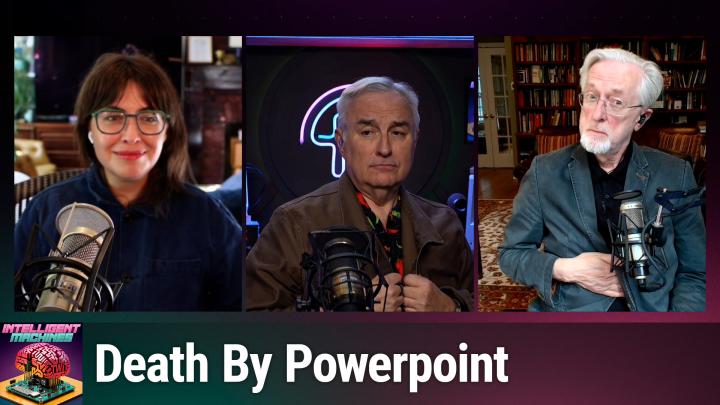Richard Gingras: Why News Organizations Must Embrace AI
AI-created, human-edited.
The news industry stands at a pivotal crossroads. While artificial intelligence threatens to flood the information ecosystem with "AI slop," it simultaneously offers unprecedented opportunities for journalistic innovation. Few people understand this paradox better than Richard Gingras, who recently stepped down after 15 years as Google's Vice President of News.
In a wide-ranging interview on Intelligent Machines, Gingras delivered both sobering assessments and surprising optimism about journalism's future, challenging conventional wisdom about everything from business models to the role of AI in newsrooms.
Host Leo Laporte opened with a pressing question about journalism's trust problem, noting how even established publications face skepticism from readers. Gingras's response cut to the heart of the industry's self-deception.
"There's a tremendous amount of arrogance in journalism," Gingras observed. "There's a tremendous amount of assumption that we know the answers, when the answers aren't necessarily knowable."
Rather than demanding that audiences simply trust journalists more, Gingras argued that news organizations must fundamentally rethink their approach. The problem isn't that people don't understand journalism's value—it's that journalism hasn't adapted to earn trust in a fragmented media landscape.
"We have to stop pointing fingers at others as solutions to our problems," he emphasized, rejecting the common refrain that better media literacy will solve journalism's credibility issues.
Co-host Paris Martineau raised concerns about whether news can ever be truly profitable in the digital age. Gingras's answer was refreshingly direct: the business models already exist, and publishers need to stop pretending otherwise.
"The business models are known," he stated. "At the national level, it's clearly going to be largely driven by subscription... At the local level, advertising can still work."
Gingras pointed to examples like The New York Times, which has successfully built a subscription base approaching 10 million, and Village Media in Canada, which has achieved profitability in every local market through innovative community engagement strategies.
The real problem, according to Gingras, lies with publishers who refuse to innovate. Legacy outlets owned by hedge funds focus on "harvesting assets" rather than building sustainable businesses, while well-intentioned startup news organizations mistakenly believe philanthropy will sustain them indefinitely.
"One challenge among the emerging players is they were founded by journalists coming out of newsrooms," Gingras noted. "They would rather eat worms than go to a local merchant and sell an ad."
The conversation's most compelling section focused on artificial intelligence's dual nature as both threat and opportunity for journalism. While host Leo Laporte expressed concerns about AI "slop" overwhelming quality journalism, Gingras took a decidedly optimistic view.
"There is actually no facet of the journalistic profession that can't be improved and enhanced by the use of AI," Gingras declared.
He shared examples of AI's transformative potential, from analyzing massive document troves for investigative reporting to monitoring data streams for emerging stories. Gingras described a Google project that could have detected the Flint water crisis months early by analyzing search queries about water problems.
"If we had looked into search queries six, eight months before the water crisis, you saw queries that said my water smells bad, my water tastes bad," he explained. "You put those signals in front of thoughtful reporters and they go oh, maybe there's something we should be digging into."
Perhaps Gingras's most intriguing insights concerned local journalism, where he sees the greatest innovation potential. His work with Village Media demonstrates how local news can thrive in the digital age through radical rethinking of community engagement.
The Canadian company doesn't just publish articles—it creates what Gingras described as "a local community interest network, basically a very nicely designed Reddit for local." This approach recognizes that successful local media must facilitate community connection, not just deliver information.
Gingras also shared fascinating research from Chicago revealing that people's information needs are "proportionate to physical proximity"—readers care far more about their immediate neighborhood than metropolitan-wide issues. The only exception? Sports teams.
"In Chicago, for instance, the only topic of broad metropolitan interest is the Bears," he noted, highlighting why traditional metropolitan dailies have struggled to find their place in the digital ecosystem.
Martineau pressed Gingras about his experience during Google's transition from search company to AI leader, particularly the competitive dynamics with OpenAI's ChatGPT launch.
Gingras revealed that Google had been cautiously developing language models for years but was surprised by OpenAI's willingness to release an unfinished product. "We were surprised because we had the models and they were testing the models and they knew that there were flaws," he explained.
The difference came down to risk tolerance: OpenAI could afford to release an imperfect product, while Google, with billions of users, needed to ensure reliability before launch.
The interview tackled the contentious issue of AI training on copyrighted content, with Gingras taking a notably progressive stance. Drawing on Thomas Jefferson's philosophy, he argued that overly restrictive copyright law stifles innovation and learning.
"All creativity is derivative," Gingras observed. "We learn from people before us." He questioned the consistency of authors who object to AI learning from their work while having built their own careers on studying previous writers.
While acknowledging that some content licensing will occur—particularly for specialized or valuable datasets—Gingras cautioned publishers against expecting "a golden pot of cash at the end of the LLM rainbow."
Despite acknowledging journalism's challenges, Gingras concluded with measured optimism. Success requires abandoning finger-pointing and embracing innovation across multiple dimensions—from business models to technology adoption to community engagement.
"I do see solutions, I do see constructive paths," he said. "But we just have to stop pointing fingers and say everything would be fine if social networks didn't exist."
For news organizations willing to adapt, Gingras sees a future where AI enhances rather than replaces human journalism, where local communities can support sustainable news businesses, and where trust is rebuilt through transparency rather than demanded through authority.
The question isn't whether journalism will survive the AI revolution—it's whether journalists will embrace the tools and strategies necessary to thrive in it.
